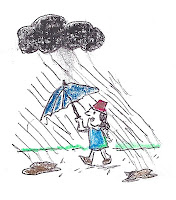 |
| A "frog strangler and root soaker." |
In my childhood, rainy days inspired
art in our family home. My mother, an artist, brought out boxes of crayons,
coloring books, art pads, and, at times, pastels and would sit on the floor or
at the oak dining table with us, coloring away for hours during summer
downpours in Baton Rouge, Louisiana. It was also reading time, and until I was
seven years old, I thought Robert Louis Stevenson’s A Child’s Garden of Verse was
a book written solely for rainy, summer days. Remember “The Rain is raining all
around/it falls on field and tree; / it rains on the umbrellas here/and on the
ships at sea?” This was a bit of unsophisticated verse, but the illustrations
in the several versions of Stevenson’s book of poetry my family owned, gave us a
feeling of coziness and safety that lingers with me on rainy days.
As a child, I knew nothing about
the Dust Bowl and the terrible drought endured by the Oklahoma farmers before
they moved toward California, seeking employment and water, and found similar weather
and economic conditions. Today the drought forecast for southern New Mexico,
Colorado, and Texas is high, and yesterday I received a message from Indie
publisher Gary Entsminger, who lives on the Uncompaghre Plateau near Montrose,
Colorado, that described the need for rain and water:
“The drought continues here, as
does our efforts to maintain extra water at “The Castle” (Gary’s cabin on the Plateau).
Yesterday, neighbor Bob came up well before 7 a.m., and we went to see the
eaglets (they’re almost ready to fledge, weeks ahead of normal). When we
returned, he and I went to the valley for 900 gallons of water. We use his
heavy duty pick-up and a flatbed trailer to haul a 1200-gallon tank, which took
a bit of effort to get on the trailer. Nine hundred gallons x eight pounds is a
lot of weight to pull, even for a big pick-up with lots of torque, so that’s
all we put in the tank at a time. Tri-County water, which is what most of
Montrose, Delta, and Ouray counties drink, is 25 cents for 300 gallons. We put
a quarter in a machine and watch. It’s a very fast pump and quite a deal. So
mostly, it’s our time and a couple gallons of gas per load of water.
“Then he and Susan went to
Montrose to pick up our 350-gallon water tank and fittings. On the way back,
they got a 300-gallon load from the valley. We ran that into the cabin holding
tank, then pumped water from that tank into the two 300-gallon tanks attached
to the rain gutters. There has been no rain, so those were empty. Meanwhile,
the well continued to replace water in the cabin holding tank. By 2 p.m. we had
the 900 gallons, the two 300-gallon tanks filled, and the holding tank under
the cabin (1,000 gallons) mostly full. The wine barrel (65 gallons) is also
full. So we have more water available this morning than we have had for quite
awhile. In summary, the water situation looks fine, and if it doesn’t rain in a
couple of weeks, we’ll do it all over again. Meanwhile, our gardens are loving
the big drinks, and our peas, etc. are flourishing. We will eat peas and onions
from the garden tonight.”
I repeat this discussion of
water to show those of us who’re enjoying rain and plentiful water that we’re
blessed right now. In an earlier message, Gary talked of doing a rain dance
with his partner, Susan Elliott, which I understand many Native Americans in
dry, southwestern regions of the U.S. still perform in late August. It’s an
intricate dance in which the men and women stand in separate lines to make
zigzag patterns, rather than the usual circular pattern. .The dance is supposed
to bring down rain for the entire year, or at least for the dry season.
I don’t know the daily status of New
England weather during 1842 when Henry Longfellow wrote his famous “The Rainy
Day,” but he seemed to develop melancholia on rainy days and penned some
doleful lines about “the day is cold, and dark, and dreary; /It rains, and the
wind is never weary…my life is cold, and dark, and dreary; /it rains, and the
wind is never weary…” I think Longfellow needed to travel to the West and
experience a full-fledged drought to gain an appreciation for this blessing of
RAIN!
However, I can’t criticize
Longfellow too harshly because I have my own poem about rain that reflects a bit of melancholy. It’s entitled “Overflow:”
I cannot view the rain
clinging to a bank of slattern earth,
slanted from the dour heavens
without thinking the rose flatters herself
because she has caught the dew of God.
How the grass wavers,
housing the cricket’s grace notes,
and a cardinal shakes the worm
of his endurance from a muddy cave.
I eye the gutters of the world
running deep with a history of discards—
paper, tin, leaves, grass, strings,
things all broken by preyful use,
and, so, too, abuse.
I count the malefactions,
same discards in living forms
broken by use, mendacity, abuse,
traveling from the deep of human soil
until they reach the post refuge,
some innocent stream or lake,
or even the catch-all of the sea,
and drown in the bay
of the heart’s refusals.













1 comment:
"drown in the bay
of the heart’s refusals" melancholy indeed. In my poem, "After the Storm," we are still unclean. http://reflectionsontheteche.wordpress.com/2012/06/07/poetic-walk/ I was thinking about the debris, the discarded trash of our lives. Thanks for sharing.
Post a Comment